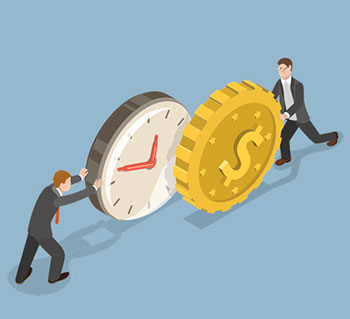The more you play, the more you risk
LONGER OR SHORTER
By Frank Scoblete
 One of the opening scenes of the 1995 movie Casino has Robert De Niro as Sam “Ace” Rothstein explaining how the casino makes money. A mega-high roller has just won millions from his casino and Rothstein and company want to get that money back. So, Rothstein arranges for the guy’s plane to have some mechanical difficulties so the high roller returns to the casino.
One of the opening scenes of the 1995 movie Casino has Robert De Niro as Sam “Ace” Rothstein explaining how the casino makes money. A mega-high roller has just won millions from his casino and Rothstein and company want to get that money back. So, Rothstein arranges for the guy’s plane to have some mechanical difficulties so the high roller returns to the casino.
Of course, this fellow is a gambler of the first order and, of course, he hits the tables once again, only to lose everything he won and then some. Rothstein explains that the longer a player plays the better it is for the casino. Why is that?
The house edge is geared to work over time, slowly grinding away at the player’s bankroll. Yes, a player can get lucky in the short run, but over time? There is no problem for the casino to win money. Time is money in the bank for a casino.
But what is not exactly explained is how the casinos make money regularly. After all, most players come to a casino infrequently, at best a few times a year. And most of these players are nowhere near a mega- high roller. Here’s how the casinos do it:
Take a look at a busy casino and think of the tens of thousands of decisions at the various games that are being made every day, sometimes every hour or less in the big ones, and realize that time can also be equated with the number of decisions a player plays. You see decisions also equal duration for the house edge to work its mathematical magic. Slot machines, video poker machines, blackjack, craps, roulette, mini-baccarat, and all those carnival table games launch those countless thousands of decisions after decisions against the player.
Yes, in that monstrous mass of players some of them are getting lucky today or tonight but that doesn’t matter; the weight of what’s happening heavily favors the casino. Just read the casinos’ monthly re- ports and you can plainly see how much each casino makes at their games.
Certainly our player above could have come back to the casino and continued his winning ways, but the point was finely made in the movie – the more you play the better the chance you’ll end up a loser.
So what is a player to do to somewhat offset that “the more play the better for the casino” fact? Play less!
What? Am I kidding here? Maybe you are the type of player who enjoys spending eight hours, maybe more, maybe less, a day in the temple of Lady Luck; how can I dare say play less? What if you only like to play a couple of hours a day?
I am not saying that you must play less time; what I am saying is simply this: In the time you spend playing, be it two hours, four hours, eight hours or more, experience fewer decisions during that time. Your expected losses over time will be far less if you do this.
Blackjack players playing a hundred-twenty hands per hour are giving the casino a good shot at them the longer they play. If that player enjoys playing five hours a day; count ‘em up: That’s 600 decisions playing against the house edge.
Think of the poor blackjack player who doesn’t play the computer derived basic strategy for his or her hands against the casino; that is asking for trouble over the few days such a player plays a year. What if that player plays weekly or every day? There’s only one word for that – yikes!
I am not going to say actually play less time since that would probably be anathema to almost all players. I am saying you can play as long as you like by separating clock time from decision-making time.
In our blackjack scenario above, what if the player could reduce his decision-making time by 20 percent? Play your five or more hours but don’t play as many decisions in that time. How to do that? Here’s a simple guideline:
- Only play at full or almost full tables. The number of decisions you face will automatically be reduced.
- If you have to go to the bathroom, do so when the game is actually in progress, not while the dealer is shuffling. The game will be there when you come back.
- Speaking of shuffling, do not play against continuous automatic shufflers as these add about 20 percent to the number of decisions you’ll face in an hour.
- Be friendly. The more players talk at the table, the slower the game goes.
- Bet less than you usually do. If you are a $25 player, go down to $20 or even $15.That reduction of play will lose you far less money over time.
- Do not be concerned with comps. They are given based on your theoretical loss, not the fact that you have a pleasing personality.
These types of approaches to the game of blackjack can also be used at just about all the other games. Next issue I will go into how to reduce the number of decisions at the various games so that the “long run” won’t hit you too soon.
All the best in and out of the casinos!
Visit Frank’s web site at www.frankscoblete.com. Frank’s books are available at Amazon.com, Kindle, Barnes and Noble, e-books and at bookstores.


